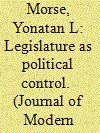| Srl | Item |
| 1 |
ID:
129447


|
|
|
|
|
| Publication |
2013.
|
| Summary/Abstract |
Notwithstanding the role that opium and narcotics have played in China's history, drug use, trafficking and other drug-related problems have been consistently condemned by the Chinese government as social vices. After being a 'drug-free' nation from the 1950s to the 1970s, drug problems resurfaced in the 1980s and China was forced to deal with such problems once again. The Chinese government is well known for its tight control over the media, and for its ability to utilize propaganda to win public support and carry out its policies. However, the Chinese government's use of the media and propaganda to deal with drug issues has never been explored. Based on longitudinal data collected from the People's Daily (from 1946 to 2009), this study examines two key issues: the ways in which the government has utilized ideology in its official stories over time, and the means through which the government has tried to re-establish its drug control in the 21st century. The data suggest that the use of 'hard-core' ideology as a tool has not only drastically declined over time but also undergone significant modifications. The Chinese government has adopted a multifaceted approach to drug control and it has managed to present a unified voice in the media in combatting drug problems.
|
|
|
|
|
|
|
|
|
|
|
|
|
|
|
|
| 2 |
ID:
181834


|
|
|
|
|
| Summary/Abstract |
A growing literature has begun to more closely examine African legislatures. However, most of this research has been attentive to emerging democratic settings, and particularly the experiences of a select number of English-speaking countries. By contrast, Cameroon is a Francophone majority country that reintroduced multiparty politics in the early 1990s but continues to exhibit significant authoritarian tendencies. This article provides a longitudinal analysis of Cameroon's National Assembly and builds on a unique biographical dataset of over 900 members of parliament between 1973 and 2019. The article describes changes in the structure and orientation of the legislature as well as the social profile of its members, in particular following the transition to multipartyism. While the legislature in Cameroon remains primarily a tool of political control, it is more dynamic, and the mechanisms used to manage elites within the context of complex multiethnic politics have evolved.
|
|
|
|
|
|
|
|
|
|
|
|
|
|
|
|